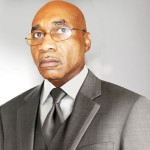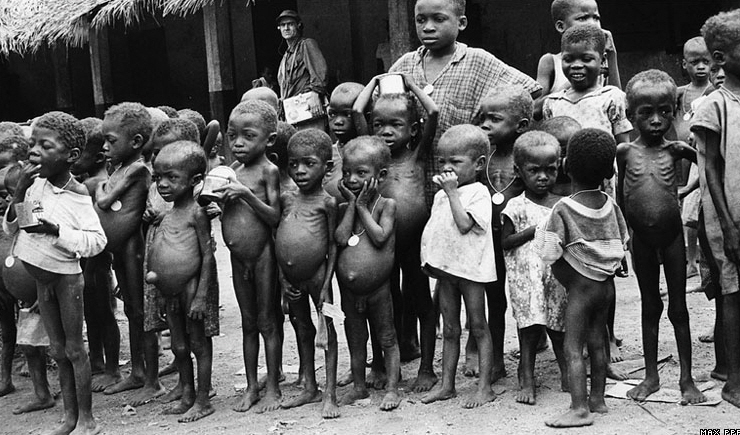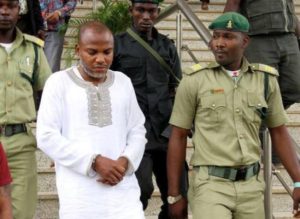
The entire regions in Nigeria have been miserable recently. Since this year, this country has witnessed the ruggedness of fiscal austerity, borne out of inability of the ruling class to strategize on a constructive economic policy.
In the last few days however, the sociopolitical trauma and misery that plagued Nigeria have basically nothing to do with an excruciating economic hardship. The country is fundamentally going through what may be considered the “May Day” effect. This circle comes every May 30 – the anniversary of the declaration of the Republic of Biafra. Each May 30 period, Nigeria shivers of guilt and frustrated conscience; tormented by their total lack of remorse and scorn of a crime against the Igbos.
Biafra was proclaimed on May 30, 1967. Monday, the anniversary of the declaration of an independent Republic of Biafra, Nigeria, again trembled in confusion – especially when the President, Muhammadu Buhari took part in this genocide that terminated millions, including defenseless children who were starved to death in a failed bid to terminate the Igbo race from the face of the earth.
Even with a “No Victor-No Vanquish” declaration after the war in 1970 by the head of state, General Gowon (retired), the Igbos have been systematically denied their rights of true Nigerian citizenship; they have been socially and economically castigated by various regimes threatened by their ingenuity; they have in fact, been prohibited from discussing this war as well as reflecting on their terrifying plights.

Various regimes have been consistent with either destroying or suppressing war documents and narratives to cover-up proofs of mass slaughter and shield their individual roles. Even as history of wars of other countries are integrated in the Nigeria’s learning system, the government would always proscribed scholarly dissertations of her own civil war, as ‘hate message’.
For instance, officers who took part in this genocide would write books where they bragged about their various commands, whereas families of victims would be prosecuted for simply expressing their tribulations. Monday in Ebonyi State, the police arrested some priests who were conducting an inter-denominational service for members of the Movement for the Actualization of the Sovereign State of Biafra (MASSOB). More than 200 armed officers had stormed the church, midway into the service and arrested the priests and other members. At Nkpor-Agu in Anambra State, the Nigerian Military attacked members of the Movement for Actualization of the Sovereign State of Biafra (MASSOB) and the Indigenous Peoples of Biafra (IPOB), who were celebrating this anniversary.
In his own explanation in the past, President Buhari had actually said that Biafra was a hate word, and that mere mention of the name “Biafra” threatens peace and stability in the populace.
To pacify his prejudice of the Biafra’s issue, he had singlehandedly influenced the legal process in arrest and prosecution of Nnamdi Kanu, a United Kingdom-based political activist the leader of the Indigenous People of Biafra. Kanu, it may be recalled was once granted bail by an Abuja Federal High Court, but was re-arrested with a fresh charge of treasonable felony. According to President Buhari, Kanu had smuggled equipment into the country just to preach hate messages.
It also might be interesting to know that in the Eastern Nigeria, still chastised by the system for being “Biafrans”, individuals are categorized as insurgents and jailed for as much as seven years for possession of handguns, whereas cattle herdsmen from the North walk around with assault rifles terrorizing villages. Also, organizations from the East –side, peacefully demonstrating for their social needs and interests are manhandled by ruthless security forces, whereas Buhari’s regime categorizes the Boko Haram terrorists as “misguided” brethren, releasing suspects from various jail houses and granting them amnesties. The regime has since procured comfortable camps to rehabilitate these members of one of world’s deadliest terrorist organization.

With this ruthlessly narrow-minded approach to handling issues related to Biafra, Nigeria’s pursuit for true unity has always, miserably remained in obscurity. President Buhari has arrogantly shown a disregard for democratic rights of thought, opinion, and expression of the Igbos; he has outlawed their rights of assembly, and demonstration; and to make it worse, he has clogged their access to justice – leaving them totally detached from the anchor of national unity.
Beyond a ruthless disregard by this regime, the circumstances surrounding Biafra’s struggle are facing other major challenges. For instance, most Nigerians believe that the term ‘Biafra’ stands for secession or revolt, and therefore, sees any person that raises the Biafran flag, or wears a Biafran tee-shirt as a secessionist. Yet, most Nigerians who witnessed this civil war from places other than Biafra saw with their naked eyes, the evils that were committed on this population. These Nigerians are a living testimony that the easterners who struggled for the Biafran state in the 60s wanted nothing other than their rights of self-existence and protection from a region where they were used, abused, hated, and frequently killed.
Today, the political landscape has totally changed, and Nigerians, and indeed the ruling class must understand that celebrating or advocating Biafra should not be ignorantly misread as a call to breakup Nigeria, but must be embraced as a mission for a needed dialogue on how Nigeria could be structured for better governance. Let it be known then that resourcefulness of the Biafran fraternity lies in her strength to stand their grounds; their ingenuity to weather a hostile political terrain; and their capacity to defend what they believe in. Thus, until Nigeria as a country respects citizens’ cause and advocacy for their interests, a peaceful and united region would be completely unattainable.
Until the leaders of this country righty create the necessary dialogue to address “Biafra” and reconcile the wishes of survivors of this genocide, the blood and spirit of millions of victims of this war would always torment the ruling system with policy disaster, service ambiguity and sociopolitical misery.
Nigeria ought to be worried that since the end of the war in 1970, this country is still struggling with leadership; dwindling from military coup to military coup – civilian regime to civilian regime; and unable to provide the very basic amenities to the citizens. Until the leaders of this country righty create the necessary dialogue to address “Biafra” and reconcile the wishes of survivors of this genocide, the blood and spirit of millions of victims of this war would always torment the ruling system with policy disaster, service ambiguity and sociopolitical misery.
Dr. Ogbo is the publisher of Houston-based International Guardian.

Stupid article by a delusional anti progress newspaper. Why would Nigeria be hunted by blood of Biafria. Are we supposed to let the stupid people invade our country without any response. Only fools pick up a fight with people bigger and stronger than them, which was exactly what the Biafrians did. I hope they were taught a good lesson, and they can keep on soaking, and licking their wounds.